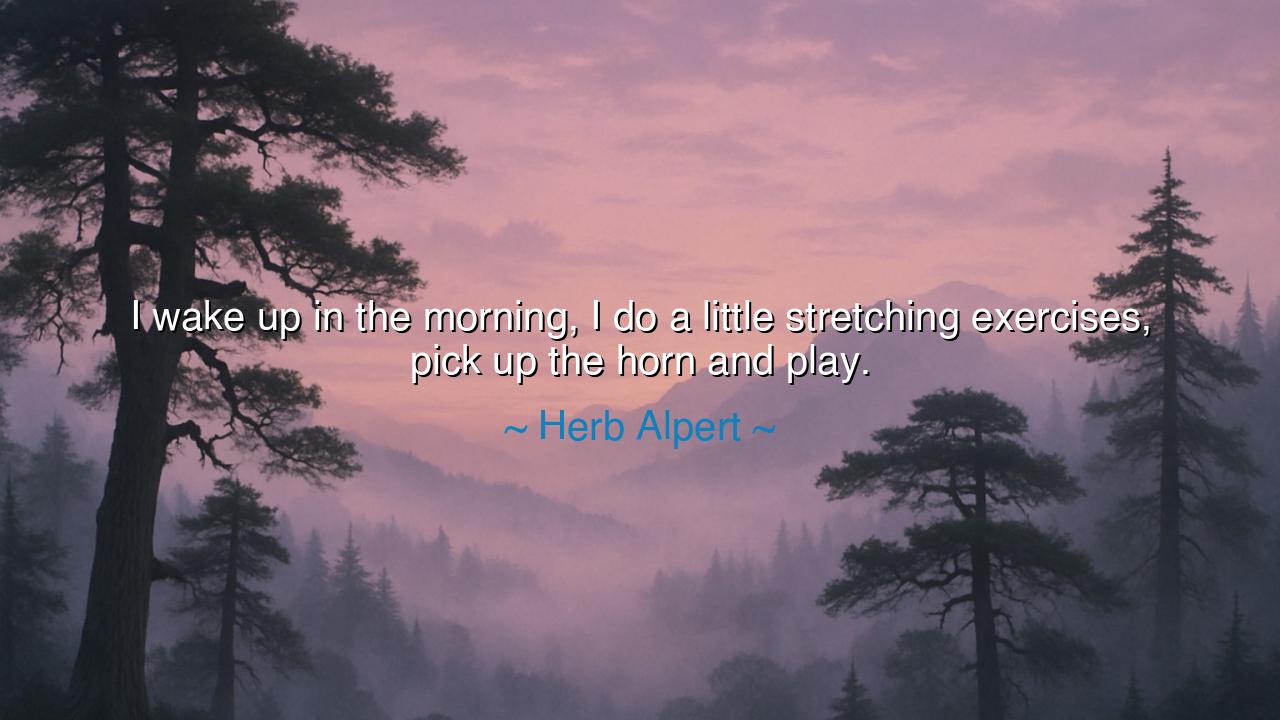
I wake up in the morning, I do a little stretching exercises
I wake up in the morning, I do a little stretching exercises, pick up the horn and play.






Herb Alpert, the master of melody, once spoke with simplicity yet with profound truth: “I wake up in the morning, I do a little stretching exercises, pick up the horn and play.” At first glance, these words seem light, the daily ritual of a musician. Yet beneath them lies the eternal wisdom of discipline, devotion, and joy. They are not merely about music, but about the art of living, the harmony of body, mind, and soul.
The morning is the sacred gateway to the day. How one begins it often determines the rhythm of all that follows. Many wake in haste, in noise, or in confusion, but Alpert teaches us to begin with calm, with care, with a deliberate practice that prepares both the body and the spirit. His stretching exercises are not just for the limbs, but for the awakening of inner strength, for the loosening of what sleep has bound, so that creativity may flow without hindrance.
Then comes the horn, the instrument through which his soul speaks. To pick it up each morning is not a burden but a blessing. It shows us that true mastery is born not in sudden bursts of genius, but in daily devotion. Just as the farmer waters the fields, just as the monk recites the morning prayer, so too does the artist give voice to his gift. In this act we learn that greatness is not the fruit of chance, but the harvest of steady, faithful tending.
History, too, reflects this truth. Johann Sebastian Bach, whose music still moves hearts centuries later, was not merely a genius of inspiration. He was a man of relentless daily practice, composing, rehearsing, and refining his craft. Like Alpert, he woke to his instruments, weaving discipline with passion. Both men show us that the eternal marriage of routine and inspiration births art that endures beyond lifetimes.
But Alpert’s words are not only for musicians. They speak to all who seek purpose. For the horn can be any tool — a pen for the writer, a brush for the painter, a hammer for the builder. What matters is not what is held in the hand, but the spirit with which it is lifted every morning. To rise, to stretch, to take up one’s tool, and to play — this is the rhythm of a life well-lived.
The lesson is clear: if you would find greatness, do not wait for the thunder of sudden inspiration. Begin each day with ritual. Prepare your body, quiet your mind, and then take up your instrument of destiny. Practice, not once, not sometimes, but every morning, until it becomes as natural as breathing. In this constancy lies strength, and in strength lies beauty.
Practical actions flow easily from this wisdom: set aside a space, however small, for your craft. Dedicate a portion of the morning to it, before the world’s noise claims your attention. Do not burden yourself with the thought of perfection; instead, focus on the act, the playing itself. Over time, like Alpert, you will find that these small rituals carve out not just skill, but joy — and joy shared with others becomes legacy.
Thus, when Herb Alpert speaks of stretching, lifting the horn, and playing, he is not describing a mere habit. He is handing us a blueprint for life. Begin with care for the body, move with devotion to the craft, and end with the music of the soul. This, children of tomorrow, is how one awakens not only the morning, but the eternal within.






AAdministratorAdministrator
Welcome, honored guests. Please leave a comment, we will respond soon